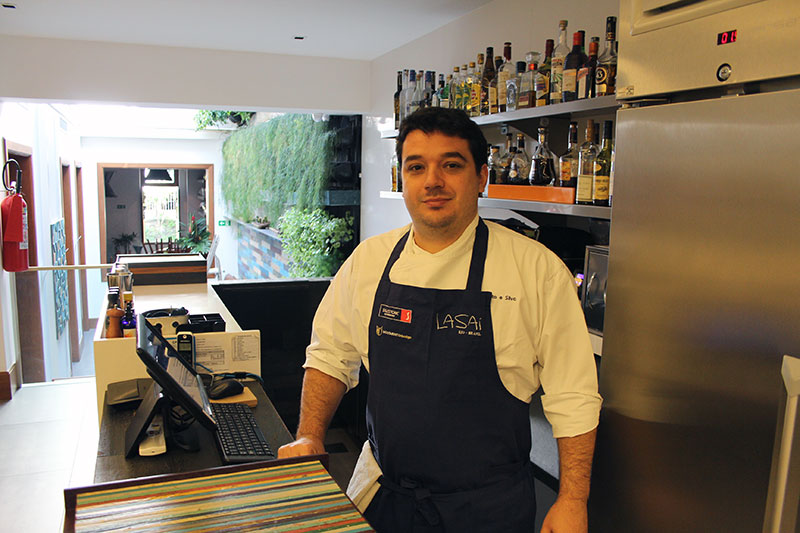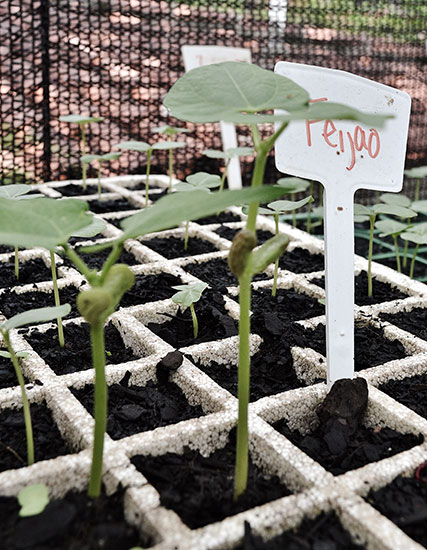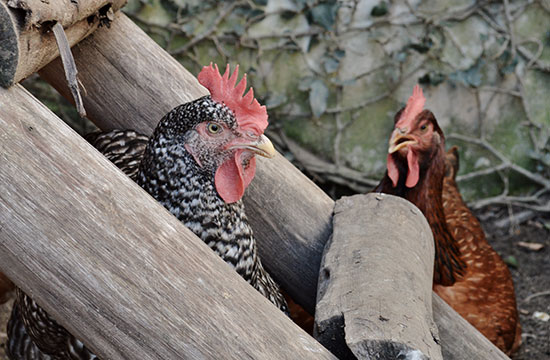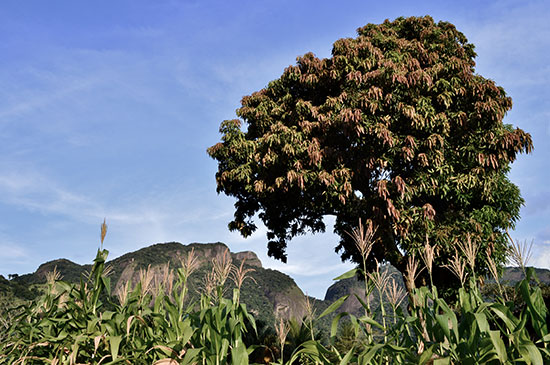Reporting from Rio: Q&A with Chef Rafa Costa e Silva
We chat with the Michelin-starred chef about farming, local produce, gold-medal cuisine, and, of course, the Olympics.
Reporting from Rio: Q&A with Chef Rafa Costa e Silva
We chat with the Michelin-starred chef about farming, local produce, gold-medal cuisine, and, of course, the Olympics.

After a months-long search for a location, followed by another year and a half of renovations, Costa e Silva opened his restaurant Lasai in 2014, in a 110-year-old house in Rio’s Botafogo district beneath the famously outstretched arms of the Cristo Redentor. Awards, recognitions, and a Michelin star soon followed.
Early on a Saturday morning, with the city in full Olympic swing, 37-year-old Costa e Silva chatted with Modern Farmer about getting fresh and local food in Brazil, the Olympics, and how he stumbled into farming.
This interview has been edited and condensed for clarity.
Modern Farmer: Why did you come home to Rio?
Rafa Costa e Silva: The idea was to open my own restaurant. Mugaritz was my dream job. I thought nothing would make me as happy as Mugaritz except for my own restaurant, where I could do exactly the things that I want, how I want. I said, “I have to give it a shot.” We decided to open in Rio, to be close to my family, my friends. I was away for 10 years.
MF: How do you describe Lasai?
RCS: We don’t really have a style. We don’t do avant-garde. We don’t do Brazilian food. We cook things that we like to cook – things that I have in my garden, things that we get at the organic street markets here in Rio. We cook in a really simple way. Above all, I want the food to be good. So we just cook good food with really good ingredients. We use almost no butter. Almost nothing’s fried. It’s all just really fresh.


MF: What’s the menu like?
RCS: We have two menus. One we call “Festival.” You just tell us any allergies or restrictions and we prepare whatever we want with whatever we have. It’s like a surprise menu. Our other menu we translate in English as “Don’t Mess With Me.” You don’t want us to tell [you] anything about the garden, or about the products, or about the producer. You just want to sit down, eat, and leave. It just has an entrée, a main course, and dessert, and we give you some options.
MF: How did you get interested in fresh, local food?
RCS: The five years I was in New York, I never talked to a producer. I would just get to work, go to the walk-in, get my products, cook, and leave. I never paid attention to quality because I was a cook, just doing my job. And then I went to Spain. Spanish people have a completely different view of food. At Mugaritz, we would talk to purveyors. We would plan the menu according to the season. We would make sure the produce was good enough. That’s where I learned to appreciate product quality. In my opinion, Spain is the best place in the world to eat – by far.
MF: What’s been your experience sourcing your ingredients here?
RCS: When I got back [to Rio], I couldn’t find a bunch of products with the high quality that I wanted. I wanted yellow carrots. I wanted parsnips. I wanted rhubarb. And I just couldn’t find them. So we started our garden.
MF: You’re a farmer by necessity, then?
RCS: When I came back to Brazil, I wasn’t thinking, “I’m going to be a farmer.” But when we were opening, I was like, “I can’t get a celery root or a parsnip or a romanesco.” There’s a bunch of vegetables that you just can’t get. So we said, “Let’s try it ourselves.” I’ve ended up liking it a lot. We have a small garden here in Rio. My wife and I built it with our hands on an abandoned a piece of land. Now we just have eight different kinds potatoes planted there, because I don’t have the time or staff to work there more. And we have a much bigger one up in the mountains. There, we have one guy taking care of it full-time.

MF: But you also buy directly from farmers?
RCS: I go to organic markets on Tuesdays, Thursdays, and Saturdays. On Tuesday, I got at like 6:30 in the morning, and I stay there a pretty long time. And we have two producers from the countryside next to the garden I have there. They bring us whatever they have every week.
MF: What’s the local food scene like here?
RCS: Lots of chefs talk about it, but very few go to the markets. They go and they buy a cup of baby carrots and put in on the plate because it’s cool, it’s trendy, and they can talk about it. Here in Brazil, we’re still very, very far from the ideal, and we’re a lot farther than we think we are, because a lot of people who are talking about it, they don’t actually do it. Lots of people who say that they use fresh vegetables buy it from a big central produce market in Rio. It comes from all over the place – from Peru, from Jamaica, from the north of Brazil, from the south of Brazil. It’s not local at all, and it’s not fresh. People think that just because they’re going to this market that they’re buying fresh. Very few people in Rio are actually working with fresh ingredients, because it’s super hard and it’s super expensive. It would be a lot cheaper for me to not have my garden, and to tell you the truth, if some of my products came from this central market, very few people would notice. We garden and source locally because we like it, because we believe in it, and because we think we can change things by doing it.
We garden and source locally because we like it, because we believe in it, and because we think we can change things by doing it.
MF: So there’s a sense of mission to this whole thing?
RCS: I’m not sure… Right now I’m on a mission to make my restaurant survive. We’re really, really, new, and thank god, we’re full almost every day. Last year, even without the Olympics, we only had 10 days when we weren’t full. Having a restaurant like this is very expensive, and it’s the first restaurant that I’ve had, and it’s a little bit challenging for me now. I’m focusing on trying to grow the restaurant, trying to make it more profitable, and not ever losing the quality.
MF: Are you getting lots of business now from people who’ve come to watch the Olympics?
RCS: Yes. In general, our customers include lots of people from abroad, but now it’s even more so. Yesterday, all of the tables were speaking English.
MF: Are you feeling some extra hometown pride now during the Games?
RCS: Yes. Things weren’t all done in the correct ways, but then, what’s the surprise? We are in Latin America. Nothing here is done the way it’s supposed to be done. People always leave things for the last minute. It’s the way people are. The metro could have been working a year ago. It was supposed to have been. But we all knew from the beginning that it was going to happen. So I feel proud, but I think we could have done a lot better. We could have left a better legacy for the city, but we started planning very late and we started doing very late.
MF: The headlines have been making Rio sound like a horrible place. What do you want people to know about your hometown?
RCS: The media can be very malicious. These people are writing about things they don’t even know about. They’re writing from abroad. They’re over-afraid of everything. I came back in 2012. I walk everywhere, and I feel pretty safe. I don’t have any friends, or friends of friends, who have gotten Zika. People are writing about these things without understanding the scale of the problem. Of course, I think that people should write about bad things, because that helps pressure our politicians to improve things. But people should be less afraid of life. I lived in the United States for five years. There’s places where you don’t go at certain times. In Spain it’s the same. It is what it is. But there are so many more things that are good that you could write about.
MF: Like what?
RCS: The happiness of people. Actually visiting a favela in the afternoon and seeing how it is. People are very nice, people are friendly. It’s a beautiful city. If you go to the countryside, it’s even prettier. As I said, some places you shouldn’t go at certain times, but I think it’s a pretty safe city. At all my tables full of people from abroad now, they’re asking, “Where is all this bad stuff that everybody was writing about?”
Follow us

This work is licensed under a Creative Commons Attribution-NoDerivatives 4.0 International License.
Want to republish a Modern Farmer story?
We are happy for Modern Farmer stories to be shared, and encourage you to republish our articles for your audience. When doing so, we ask that you follow these guidelines:
Please credit us and our writers
For the author byline, please use “Author Name, Modern Farmer.” At the top of our stories, if on the web, please include this text and link: “This story was originally published by Modern Farmer.”
Please make sure to include a link back to either our home page or the article URL.
At the bottom of the story, please include the following text:
“Modern Farmer is a nonprofit initiative dedicated to raising awareness and catalyzing action at the intersection of food, agriculture, and society. Read more at <link>Modern Farmer</link>.”
Use our widget
We’d like to be able to track our stories, so we ask that if you republish our content, you do so using our widget (located on the left hand side of the article). The HTML code has a built-in tracker that tells us the data and domain where the story was published, as well as view counts.
Check the image requirements
It’s your responsibility to confirm you're licensed to republish images in our articles. Some images, such as those from commercial providers, don't allow their images to be republished without permission or payment. Copyright terms are generally listed in the image caption and attribution. You are welcome to omit our images or substitute with your own. Charts and interactive graphics follow the same rules.
Don’t change too much. Or, ask us first.
Articles must be republished in their entirety. It’s okay to change references to time (“today” to “yesterday”) or location (“Iowa City, IA” to “here”). But please keep everything else the same.
If you feel strongly that a more material edit needs to be made, get in touch with us at [email protected]. We’re happy to discuss it with the original author, but we must have prior approval for changes before publication.
Special cases
Extracts. You may run the first few lines or paragraphs of the article and then say: “Read the full article at Modern Farmer” with a link back to the original article.
Quotes. You may quote authors provided you include a link back to the article URL.
Translations. These require writer approval. To inquire about translation of a Modern Farmer article, contact us at [email protected]
Signed consent / copyright release forms. These are not required, provided you are following these guidelines.
Print. Articles can be republished in print under these same rules, with the exception that you do not need to include the links.
Tag us
When sharing the story on social media, please tag us using the following: - Twitter (@ModFarm) - Facebook (@ModernFarmerMedia) - Instagram (@modfarm)
Use our content respectfully
Modern Farmer is a nonprofit and as such we share our content for free and in good faith in order to reach new audiences. Respectfully,
No selling ads against our stories. It’s okay to put our stories on pages with ads.
Don’t republish our material wholesale, or automatically; you need to select stories to be republished individually.
You have no rights to sell, license, syndicate, or otherwise represent yourself as the authorized owner of our material to any third parties. This means that you cannot actively publish or submit our work for syndication to third party platforms or apps like Apple News or Google News. We understand that publishers cannot fully control when certain third parties automatically summarize or crawl content from publishers’ own sites.
Keep in touch
We want to hear from you if you love Modern Farmer content, have a collaboration idea, or anything else to share. As a nonprofit outlet, we work in service of our community and are always open to comments, feedback, and ideas. Contact us at [email protected].by Andrew Jenner, Modern Farmer
August 16, 2016
Modern Farmer Weekly
Solutions Hub
Innovations, ideas and inspiration. Actionable solutions for a resilient food system.
ExploreExplore other topics
Share With Us
We want to hear from Modern Farmer readers who have thoughtful commentary, actionable solutions, or helpful ideas to share.
SubmitNecessary cookies are absolutely essential for the website to function properly. This category only includes cookies that ensures basic functionalities and security features of the website. These cookies do not store any personal information.
Any cookies that may not be particularly necessary for the website to function and are used specifically to collect user personal data via analytics, ads, other embedded contents are termed as non-necessary cookies.